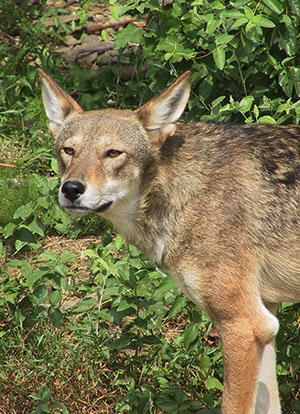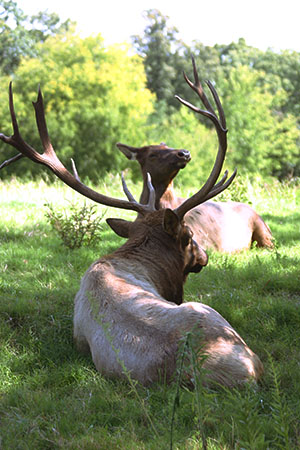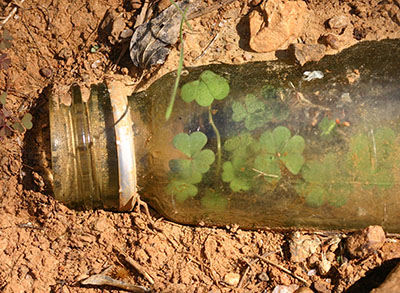There’s a method of presenting information that I see way too much of, from writers and educators that really should know better, and I can’t help but believe it’s doing more harm than good. I’ve probably used it a few too many times myself, but now I’m going to be aware of it and try never to use it, at least in circumstances where it is misleading. I refer to “language of intent or deliberation,” which is kind of a vague way of putting it that makes academics happy but doesn’t really explain anything. To put it more casually, it’s assigning thinking processes to things that do not possess them.
 Richard Dawkins used it extensively in The Selfish Gene, and now I see Steven Pinker doing it, both of them in relation to evolution, one of the most misunderstood concepts in science. Sure, quantum physics rates higher on the nonplussed scale, but quantum physics really is complicated and counter-intuitive; natural selection is far simpler – this simplicity is what makes it work, and what should be assisting the understanding of it.
Richard Dawkins used it extensively in The Selfish Gene, and now I see Steven Pinker doing it, both of them in relation to evolution, one of the most misunderstood concepts in science. Sure, quantum physics rates higher on the nonplussed scale, but quantum physics really is complicated and counter-intuitive; natural selection is far simpler – this simplicity is what makes it work, and what should be assisting the understanding of it.
One common example is seen often, even though this is a minor example compared to some. We are frequently told that wolves weed out the old and the sick members of a herd of deer or elk, thereby increasing the strength of the herd overall. Bluntly, this is nonsense; wolves capture whatever they can, and quite often it’s the young members of the herd, the ones that serve as the genetic future. One could as easily say that the herd on average outruns the wolves, and this is slightly more accurate, though still misleading if it is presented in the way that either species chooses to make certain actions. Wolves eat; deer/elk try not to be eaten – even the young, the old, and the sick. There’s nothing more to it than that, and none of them think about what would work best.
People might say that this is where natural selection works, that the wolves serve as ‘selectors’ for the prime members of the herds – the ones that survive are the ones that are better. This is true to a small extent, but far less than is implied by the example. If we take it at face value, the wolves would be preventing genes that allowed deer to get old or sick – and also allowed them to be young and helpless. Obviously this is nonsense; every species starts young, every species has the ability to get sick, every species dies. Wolves do not act on these factors any more than any other survival hurdle does. We could just as easily say that hard winters ‘act’ to strengthen the herd. In such a case it’s considered poetic license, since we don’t believe climate does anything intentionally. But we do believe animals act with consideration, so the deliberate action language can serve to muddy the waters. More on this in a moment.
The biggest issue is that genes are propagated only by reproduction; whatever genes the species was born with, it passes on to its offspring. In truth, slightly less than 50% of the genes from either parent get passed on, for all two-parent systems – roughly half of the genes lose the lottery of random selection between the two parents as their contributions combine into the fertilized egg, while a tiny percentage of others spontaneously mutate into something else. But what this means is that wolves ‘weeding out’ the old or the sick are doing nothing at all genetically. The older members of the herd have already passed along their genes if they were going to – the wolves are too late. And any sick ones of reproductive age are only affected if the sickness occurred because of a genetic trait, and was not sufficient to prevent reproduction on its own. The newborns that fall prey are a facet of selection – they are caught before they reach reproductive age, so their genetic legacy is interrupted by predation – but the impact on genes is fairly low; some gene may appear that encourages faster development, so they’re not as helpless when the wolves appear, but there’s a limit as to how much this could accomplish. They’re already born with the ability to stand and walk within hours of birth, and this certainly was an aspect of selection. They’re not, however, going to develop in the mother’s womb to the point of being able to outrun all predators before the amniotic fluid dries. If they could get that big and developed, the mother would start seeing the disadvantage of carting around that loaf in the oven, and lose the selection process in that manner. Note that this option also requires more than one trait: the tendency to develop longer in the womb, and the mother’s change in physiology to accommodate this. This involves at least two genes to accomplish, but probably dozens more, so it would take a lot longer to occur.
 Protective herds are, of course, a behavior that has been selected for, as are the protective instincts of the parents – these evolved right alongside all other traits, and each one has an impact. What this means is that survival of the genes relies on many points of convergence, so any one selective factor – predators, food sources, climate, etc. – has only a partial effect on the process. What selection produces is not an ideal organism, but one that balances both environmental influences and the random genetic changes that occur into something that, on average, works better than before. It’s actually pretty haphazard and slow, which is what’s fascinating about it, because the species we see now had to be shaped by millions of causes over long periods of time.
Protective herds are, of course, a behavior that has been selected for, as are the protective instincts of the parents – these evolved right alongside all other traits, and each one has an impact. What this means is that survival of the genes relies on many points of convergence, so any one selective factor – predators, food sources, climate, etc. – has only a partial effect on the process. What selection produces is not an ideal organism, but one that balances both environmental influences and the random genetic changes that occur into something that, on average, works better than before. It’s actually pretty haphazard and slow, which is what’s fascinating about it, because the species we see now had to be shaped by millions of causes over long periods of time.
Mind you, the wolves are not only selectors themselves – they are also selectees, guided by the development of deer and elk to run faster and hunt more efficiently. It would serve in their best interests not to get the inadequate sources of protein, but to get the prime examples from the herd; nailing the biggest, healthiest member is a far more efficient use of their effort than getting some stringy old cancer victim. The deliberate language so often used seems to present wolves as a fixed trait, while the ungulates can be shaped; naturally, both can change according to the traits of the other, and many more traits besides. It’s much more like some of our competitive sports, where manufacturers try to come up with clothing, for instance, that allows a tiny bit more freedom of movement, that provides a tiny advantage over other competitors that lack it – which lasts only until the others either get the same clothes, or obtain another tiny advantage of their own. Gradually these advantages accumulate and shape the way the sport is played.
In the middle of all this sits the environmental factor. Conditions change, often much more rapidly than a species can adapt to them. Every species not only copes with the other species around it than may prey upon it, or provide food, or simply eat the same food, it also deals with how the climate has changed, or if a food source becomes scarcer, or if a river or land bridge has changed the area they live within. They cannot choose what changes are made by natural selection, or decide that going north is a good idea – they are all beholden to whether a beneficial trait may arise in time. Often enough it doesn’t, and extinction occurs. But this also means that perfect adaptation is next to impossible – each advantage over conditions lasts only so long, and new ones must appear in the gene pool and be selected for all of the time. The language may not be to blame for this, but often the impression is that natural selection has led up to the current state and stopped, as if this is an end result, when in reality it is ongoing – it’s just slow enough that we can rarely see examples of selection taking place. Any species may have traits that don’t work very well in current conditions, and eventually these may change for the better.
But the deliberate language does work in another way that’s extremely detrimental. The idea that wolves are purposefully picking out the old and the sick implies a long-abandoned selection concept known as Lamarckism: that what the species does in their life affects the nature or effect of the genes that are passed along, as if these can be altered during the lifespan of the animal. This is perhaps the biggest misconception of evolution, still extant after all these years, and I really do believe this is helped along by such language. With a few tiny exceptions that have recently been discovered (and are not very well researched yet,) the genes that a species is born with are the ones passed along to the offspring. The only way that they have an effect as a selective trait is if a) they provide a change in behavior or ability, and b) this change is sufficient to affect the reproductive chances of the possessor. A wolf, deer, elk, or even human that reasons out something cannot pass this onto its offspring in any way, unless the ability to make such mental connections was provided by genes in the first place. No matter how much anyone learns, or how physically fit they’ve become, they’re not passing this on to their kids genetically; the offspring can only obtain it through their own efforts after birth. The only thing that someone might be passing on is a genetic tendency to believe that education in this manner is a good idea, or a faint trend towards tougher muscles, that they were born with – a gene mutation that produced these effects. Herd animals are not inclined to protect the elderly or the infirm, because that behavior is a liability to the entire herd; some members may trend towards this behavior through the genetic lottery at any time, but since it doesn’t provide any survival or reproductive advantage to those still capable of passing along their genes, it doesn’t propagate more than any other behavioral variation that may arise.
 Which brings us to the gene level, where deliberate language is a major factor of confusion. Genes do not do anything except spark the development of proteins under certain conditions; they are far less active than a grass seed that germinates when surrounded by adequate moisture and nutrition, and are much more like an alarm clock that rings at certain times. Their propagation in any species relies on the survival of the individual that possesses them, and the lottery that may just drop them out in favor of the gene from the other parent, or the rare mutation that occurs. When a new gene mutation provides some slight advantage in survival or reproduction, it stands a better chance of getting to offspring, and in multiple generations of this process, it can become more prevalent in the gene pool of the species, first in a local group, and eventually in time throughout the entire population. The gene does not try to survive; it does not survive at the expense of others; it does not compete. Natural selection sees that tiny advantages can add up over time – again, on average. Note that it is not just the singular gene that propagates from any advantage it might provide to an organism – every gene that the organism possesses at that time, including the detrimental ones, gets selected and is along for the ride. The detrimental ones may also prevent the beneficial ones from propagating as well; it all depends on what the nature of each trait is, and whether it has a significant effect on the reproduction of the individual.
Which brings us to the gene level, where deliberate language is a major factor of confusion. Genes do not do anything except spark the development of proteins under certain conditions; they are far less active than a grass seed that germinates when surrounded by adequate moisture and nutrition, and are much more like an alarm clock that rings at certain times. Their propagation in any species relies on the survival of the individual that possesses them, and the lottery that may just drop them out in favor of the gene from the other parent, or the rare mutation that occurs. When a new gene mutation provides some slight advantage in survival or reproduction, it stands a better chance of getting to offspring, and in multiple generations of this process, it can become more prevalent in the gene pool of the species, first in a local group, and eventually in time throughout the entire population. The gene does not try to survive; it does not survive at the expense of others; it does not compete. Natural selection sees that tiny advantages can add up over time – again, on average. Note that it is not just the singular gene that propagates from any advantage it might provide to an organism – every gene that the organism possesses at that time, including the detrimental ones, gets selected and is along for the ride. The detrimental ones may also prevent the beneficial ones from propagating as well; it all depends on what the nature of each trait is, and whether it has a significant effect on the reproduction of the individual.
As a species, we have a lot of traits that spring up in old age – drying and discolored skin, grey and thinning hair, lots of organ failures, and so on. These are obviously not advantages, and should have been selected out – and likely were, every time they occurred within the reproductive timeframe. But the tendency to appear after reproductive age never gets any chance to be selected; those genes have already been passed on before they have a detrimental effect. If we were to try and interpret a message from nature, it’s that we have no purpose beyond reproductive age (I personally have never had a purpose, since my genes went nowhere.) But there’s no message, and no purpose (whew!) – this is just the way that the conditions available on this planet produce a pattern. We might think it could be better or worse, but that’s just our tendency to see things with intent, a survival trait that, on average, worked for us. Nature, however, just is.




















































